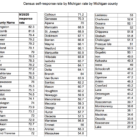News
Census faces challenges in Michigan, particularly in the north
|
Seasonal properties, vacant houses, the lack of internet, distrust of government and fewer census takers, not to mention the pandemic, are challenges to the 2020 U.S. census, especially in Michigan’s rural northern counties, census experts say. Statewide, about 71% of Michigan households self-reported their numbers online to the U.S. Census Bureau. That’s better than the national rate of 62.1%. But the statewide number obscures low rates of self-response in the low-population rural north. By Zholdas Orisbayev FOR BAY MILLS, MARQUETTE, BIG RAPIDS, SAULT STE MARIE, ST. IGNACE AND ALL POINTS





